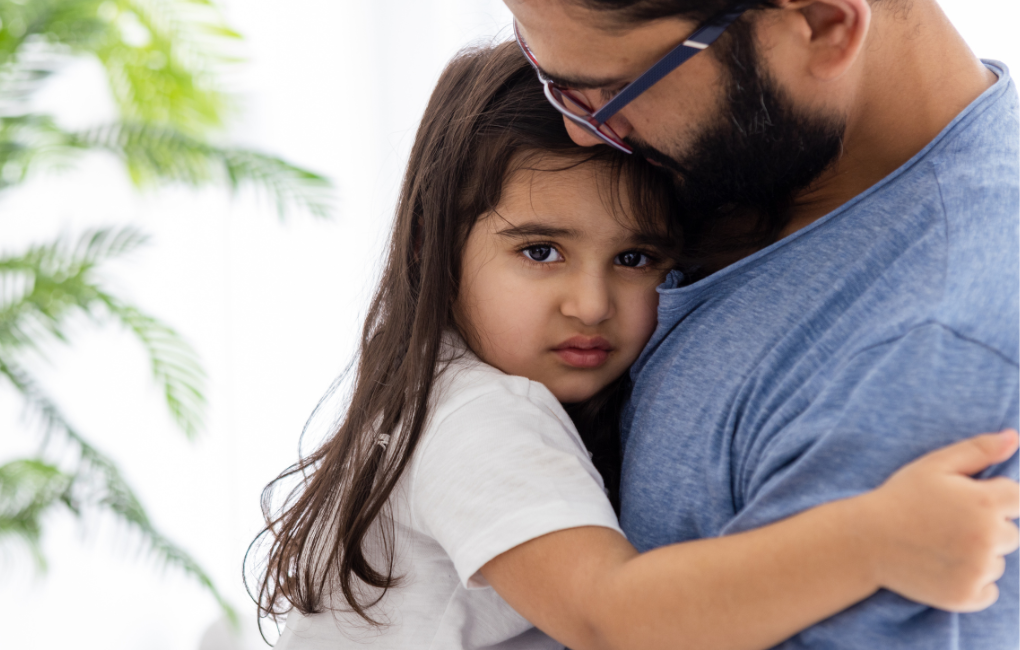
All About Anxiety (Part Three)
In part three, you’ll learn five practical, faith-filled ways to cope with anxiety—for both you and your child—with grace, compassion, and God’s steady presence.
Coping with Anxiety
Coping with anxiety, whether it’s our own or our child’s, takes intentionality, compassion, and consistency. The good news is, we’re not left to figure it out alone. Scripture gives us wisdom, and science gives us tools. God created our minds and bodies, and He walks with us through every part of our emotional experience.
Here are five faith-integrated, research-supported ways we can cope with anxiety in everyday life—for ourselves and for our children.
1. Prayer
Prayer is our first and most powerful response. Philippians 4:6–7 reminds us: "Do not be anxious about anything, but in everything, by prayer and supplication with thanksgiving, let your requests be made known to God." Prayer doesn’t always erase anxiety, but it helps redirect our focus back to God and his promises.
When anxiety rises, pause, even briefly, and invite God in.
When your child is anxious, pray with them. Not only does it bring peace, but it models how to run to God in hard moments. It also sends a powerful message: you are not alone, and God cares about your worries, too.
2. Scripture
Anxiety often stems from distorted beliefs. “I have to do this perfectly,” “I’m not safe,” “It’s all on me.” Scripture exposes those lies and replaces them with truth.
Some powerful verses to hold onto:
- Matthew 6:25–27 — for worry about provision or the future
- Psalm 121 — when we need to feel protected
- Isaiah 40:29–31 — for exhaustion and discouragement
- 2 Timothy 1:7 — when fear feels overwhelming
- Romans 8:38–39 — when we need to remember we are deeply loved
Speaking these verses to yourself—and with your children—reminds you both that God is steady, present, and full of peace.
3. Calm the Body
God designed us as whole beings—body, mind, and spirit. Anxiety often shows up physically: racing hearts, tight chests, shallow breathing. Learning to calm the body helps send a message to the brain: “You're safe now.”
Some simple tools to use daily:
- Box breathing: inhale 4, hold 4, exhale 4, hold 4
- Grounding techniques: name 5 things you see, 4 you can touch, 3 you hear, 2 you smell, 1 you taste
- Movement: a short walk, stretching, or bouncing on a ball can help release stored tension
For children, try:
- Fidget tools when they need to release anxiety through an action
- “Smell the flower, blow out the candle” breathing to calm the body
- Cozy corners with pillows, soft textures, or calming visuals
- Drawing or water play to regulate emotions in a sensory-friendly way
4. Build Connection
Anxiety isolates—but healing happens in connection. Both adults and children regulate better when they feel seen, safe, and supported.
Ways to build connection:
- Make time for quality one-on-one interactions without distractions
- Be present in the moment: eye contact, physical affection, and soft tone go a long way
- When your child is dysregulated, connect before correcting
- Simply say, “You’re safe. I’m with you. We’ll figure this out together”
Connection doesn’t have to come with big answers, it just needs the presence of a safe person.
5. Know When to Reach Out for Help
Sometimes, despite our best efforts, anxiety becomes too overwhelming to manage alone. And that’s okay. God has gifted counselors and therapists with the insight and training to help us heal, grow, and process what’s hard.
Here are a few signs it may be time to reach out:
- Anxiety is interfering with daily life (e.g., work, school, sleep, relationships)
- There’s frequent panic, ongoing irritability, or emotional outbursts
- Avoidance is increasing (refusing school, isolating from others, withdrawal)
- Physical symptoms persist without medical explanation (stomachaches, headaches, sleep issues)
- You or your child feel stuck, exhausted, or hopeless
Seeking support isn’t a sign of weakness—it’s a sign of wisdom. And it doesn’t mean you’ve failed; it means you’re brave enough to take the next step.
As Proverbs 11:14 says, “In the multitude of counselors there is safety.” Getting help is a holy, healthy thing.
Helping Kids Cope Practically
In addition to those broader strategies, here are a few kid-specific techniques to build emotional resilience and reduce anxiety day-to-day:
- Follow routines. Predictability brings safety. Structure and routine are the avenues for that predictability. Routines for mornings, homework, or bedtime help reduce overwhelming feelings.
- Practice emotional check-ins. Use a simple chart or face cards to help them express how they’re feeling. Ask things like, “What color is your mood today?” or “What’s one thing on your heart?”
- Read books about emotions. Story-based learning helps kids process fear and worry more naturally.
- Model coping. Let them see you take deep breaths, step away to pray, or stretch when you're overwhelmed.
- Create a “toolbox.” Let your child help put together calming tools in a box like headphones, squishy toys, a verse card, a picture of someone they love, or a soft object.
And most importantly, celebrate effort over perfection. When they take a brave step, even a small one, affirm it:
“You were nervous, but you still tried. That’s so brave of you.”
Final Encouragement
You are not alone in this. It is never too late, and you are not unequipped. Whether you're managing your own anxiety or walking alongside a child you love, remember this: your struggle is not a disqualifier—it’s an invitation.
In moments of fear, tension, or racing thoughts, we have a choice. We can let anxiety isolate us or we can let it connect us. To our children. To ourselves. And most importantly, to the God who promises to meet us right there in the middle of it.
Anxiety doesn’t make you a bad Christian, or a bad parent. It makes you human. And as humans, we get to return—again and again—to the One who says, “Cast all your anxieties on Me, because I care for you” (1 Peter 5:7). Your anxious thoughts can become sacred moments. They can become turning points—reminders to pause, breathe, pray, and lean into the comfort and wisdom only He can give.
So, take a breath. You don’t have to carry it all. God is with you in the chaos and the quiet, in the worry and the worship. Let anxiety be a bridge—not a wall—to deeper connection with Him and deeper compassion for the hearts around you.
You are not failing. You are growing. And every time you slow down, stay present, and choose love over fear, you’re planting seeds of peace—in yourself, and in the next generation.
References
¹ Shackman, A. J., & Fox, N. A. (2021). Anxiety and the Brain: Neural Circuits and Networks. Annual Review of Clinical Psychology, 17, 459-480. https://doi.org/10.1146/annurev-clinpsy-032820-122106 .
² Anxiety and Depression Association of America. (n.d.). Facts & Statistics. Retrieved from https://adaa.org.
³ American Psychological Association. (2025). Definition of Anxiety. APA Dictionary of Psychology.
⁴ Anxiety and Depression Association of America. (n.d.). Child and Adolescent Anxiety. Retrieved from https://adaa.org.
Davidson, R. J., & McEwen, B. S. (2012). Social Influences on Neuroplasticity: Stress and Interventions to Promote Well-Being. Nature Neuroscience, 15(5), 689–695. https://doi.org/10.1038/nn.3093.
Feist, G. J., & Barron, F. (1996). Emotional Intelligence and Success: A Meta-Analytic Review. Psychological Science, 7(6), 409–416. https://doi.org/10.1111/j.1467-9280.1996.tb00357.x.
Kabat-Zinn, J. (2005). Wherever You Go, There You Are: Mindfulness Meditation in Everyday Life. Hyperion.
The Holy Bible, New International Version. Zondervan, 2011.
Jessica Wojnarowski is a Licensed Professional Counselor (LPC) at Emerge Counseling Ministries, where she is dedicated to helping individuals and families find healing through compassionate, faith-based care. She earned her Master of Arts in Counseling from Liberty University. Jessica has been married for 20 years and is a proud mom of four, drawing on both her professional training and life experience to support and guide those she serves.

